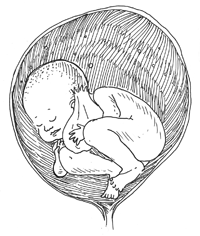STRANGEBUTTRUE- Garlic breath: Babies can smell it in uteri

DRAWING BY DEBORAH DERR McCLINTOCK
Q. When a pregnant woman eats garlicky foods, does the fetus share in the smell experience? –B. Spock
A. Fetuses are certainly quite sensitive, responding to extrauterine sounds with changed heart rate and blinking when a bright light is brought near the mother's abdomen, says Julie Menella in Why We Eat What We Eat.
But smell is harder to test. It has been demonstrated that the odor of garlic permeates amniotic fluid and is detectable by panels of adult sniffers. But still this doesn't prove fetuses can smell it. So bring on the animal studies. In one, rat pups showed a stronger preference for the herb if mom ingested plenty of it while pregnant.
So probably baby-to-be does come along for the garlic ride, especially considering that the "the normal fetus has open airway passages bathed in amniotic fluid and swallows significant amounts of it during the latter stages of gestation, inhaling more than twice the volume swallowed," according to Menella.
Q. It's been described as a "plague on the English language," maybe the worst ever. You know what it is? –V. Girl
A. "You know" is a ubiquitous, unrelenting conversational filler for both teenagers and adults, says Mark Davidson in Right, Wrong, and Risky: A Dictionary of Today's American English Usage.
But isn't "plague" an exaggeration? Well, y'know, that extreme comment indicates, y'know, how annoying it can be, y'know, when spoken communication is, y'know, continuously interrupted with "y'know." Y'know?
To break the habit, force yourself to remain silent in conversations for as long as it takes to think of your next word.
"Take my word that the pauses will be less annoying than the fillers. Gradually, most of your pauses will become so brief that they will go unnoticed. And the pauses that are noticeable will enhance your oral communication by adding a touch of suspense," Davidson suggests.
Q. What's the buzz on bee-world gender confusion? –P. Bear
A. In cartoons and advertising, bees are almost invariably depicted as male, says May Berenbaum in The Earwig's Tail: A Modern Bestiary of Multi-legged Legends. Donald Duck faced off in a dozen cartoon episodes against Spike the Bee, and Jerry Seinfeld was voice for Barry B. Benson, a male bee who in The Bee Movie announces his intention to sue New York residents for theft of his honey.
Spokesbees from the Wheat Honey's Buffalo Bee of the 1950s to today's Honey Nut Cheerios Bee are unmistakably male, with guy voices and dress and even pointy cowboy boots. Antonio Banderas, about as masculine as they get, lent his voice to the spokesbee for Nasonex allergy treatment
The irony here is that male bees have nothing to do with honey except to eat it when a female worker hands it to them. They're not called "drones" without reason: Drones don't forage for pollen or nectar, or care for offspring, or even care for themselves. All they can do is inseminate the queen, and once that's done, they die– "having dislodged many of their essential internal organs in the process, and probably leaving themselves in no mood to sing the praises of breakfast cereals," Berenbaum writes.
Q. "Why do we exist?" Is the answer to this question coming to a theater near you? –R. Descartes
A. When filmmaker Roger Nygard tackled this most existential of questions in his documentary The Nature of Existence, the movie went on to win a number of awards, says Susan Karlin in IEEE Spectrum magazine. Nygard posed the question to 170 thinkers on five continents, and it was the physicists who waxed the most philosophical.
In science, said University of Maryland's Sylvester James Gates Jr., whenever we see a diversity of viewpoints, at the end of the day they all become unified because there's only one reality. If religion is talking about something external to us, then all of those viewpoints will tend toward a similar path.
As Stanford University's Leonard Susskind expressed it, sometimes people pray hard for a miracle, and a miracle happens– meaning something very, very unlikely. But the most unlikely thing of all would be nothing unlikely happening. In this sense, a miraculous world is all around us.
Finally, marveled astrophysicist Stanford Woosley of the University of California, Santa Cruz: "The universe evolves. Stars evolve. People evolve. Everything that is alive evolves. We may be the path toward some ultimate intelligence, some ultimate life in the universe that would be virtually indistinguishable from what we call God."
~
Send Strange questions to brothers Bill and Rich at [email protected]
#